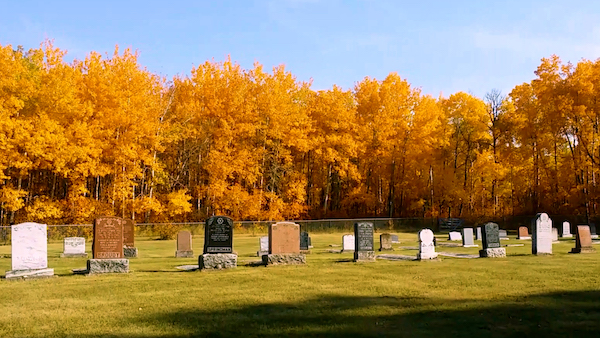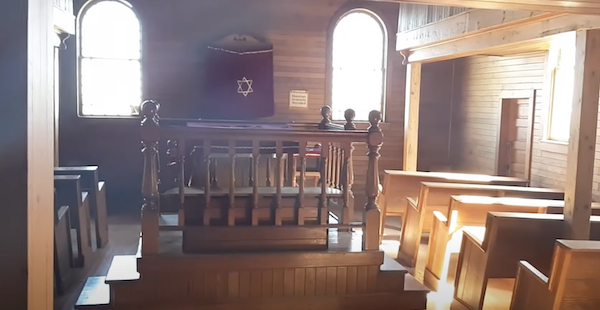Screenshot from Jordan Amit’s video on the former Jewish settlement of Edenbridge, Sask. The synagogue and the Jewish cemetery are cared for by the Saskatchewan Wildlife Federation.
Almost 120 years ago, 56 Jews fled Lithuania and ended up in a remote Saskatchewan prairie that would become the community of Edenbridge. The town and its people have scattered to the winds – but the spirit of the place comes to life again in a short video by North Vancouver filmmaker Jordan Amit.
In addition to filmmaking – which he hopes to turn into his main gig – Amit has a window-washing business and, for years, traveled to Alberta and Saskatchewan for seasonal work. Through the Chabad rabbi in Saskatoon, he learned about the abandoned Jewish settlement, which lies about two-and-a-half hours northeast of Saskatoon – the last leg on a dirt road.
The shul is beautifully maintained – or it was when Amit took his camera there – and the small synagogue is open to the public. Said to be the oldest shul in the province, the site, which includes the Jewish cemetery, is cared for by the Saskatchewan Wildlife Federation, which was granted a 40-acre plot in 1987, when the rest of the Jewish settlement’s land was sold.

The Litvaks, Lithuanian Jews, who came here did not set out for one of the coldest, most unforgiving places on earth. They traveled first to South Africa, where one of their party, Sam Vickar, saw an ad for cheap land in the Canadian West. They uprooted again, arriving in 1906 at what they would call Edenbridge.
Originally, they wanted to call it Jewtown, but the government balked. They chose Edenbridge as a sort of Anglicization of “yidden bridge,” reflecting the bridge that traversed the small Carrot River nearby.
On their initial 160 acres, bought for $10, they built Beth Israel Synagogue. Expanding out into other fields, three schools, a Jewish community hall and numerous houses would eventually form the structures of a community that, at its peak in the 1920s, was home to 170 people.
Indigenous neighbours helped teach them how to survive the first winter with sod-roofed dugouts.
While other Jewish settlements in Saskatchewan were funded by Baron Maurice de Hirsch, Edenbridge does not appear to have received such support, Amit said, though he doesn’t know that for sure.
The Depression and the general trend toward urbanization started a decline in the town and, by 1964, the synagogue ceased operation. The exact date of Edenbridge’s transition into ghost town status is vague, in part because local farmers moved to Saskatoon and returned seasonally to farm.
At the cemetery, the last gravestone is dated 2000, a departed resident who chose to be interred in the cemetery of the abandoned village. The last bar mitzvah at the shul was more recent – the child of one of the community’s descendants, in 2021. Amit had his own bar there, too. Born in Israel, he came with his family to Vancouver as a child and never became bar mitzvah. So, his friend and rabbi in Saskatoon suggested he have a belated ceremony at the historical site, and it was the first since 1976.
As more people have seen the video online, descendants of the settlers have reached out to him. He is piecing more history of Edenbridge together, and also is on the lookout for additional off-the-beaten-path Jewish (and non-Jewish) sites to explore for his growing online video explorations.

“I always have this feeling when I see Jewish sites that are kind of in the middle of nowhere, there’s something so fascinating about it,” he said, recalling a trip to the Indian province of Kerala, where he explored three abandoned synagogues. “When you go into the synagogue, it’s a special experience. You go in and you just feel this presence of the building and the silence.”
Amit invites anyone with knowledge of Edenbridge, or ideas for future videos, to contact him at [email protected]. He also recommends road-trippers make the diversion to the remote location to see the place themselves.
“It’s fully open to the public,” he said. “You just open the latch and walk inside. You only see that in Saskatchewan, that kind of trust. They just trust that it’s going to get taken care of and respected.”
In the story of Edenbridge, Amit contemplates the settlers’ tenacity and the opportunities, sometimes hard won, of newcomers to a land.
“[It is] something we could learn from, that despite difficulties of life and all the odds against us in realizing our dreams, really, if we put our mind to it, we can do whatever we want,” he said. “We can self-realize and create the life that we want, just like they did.”

